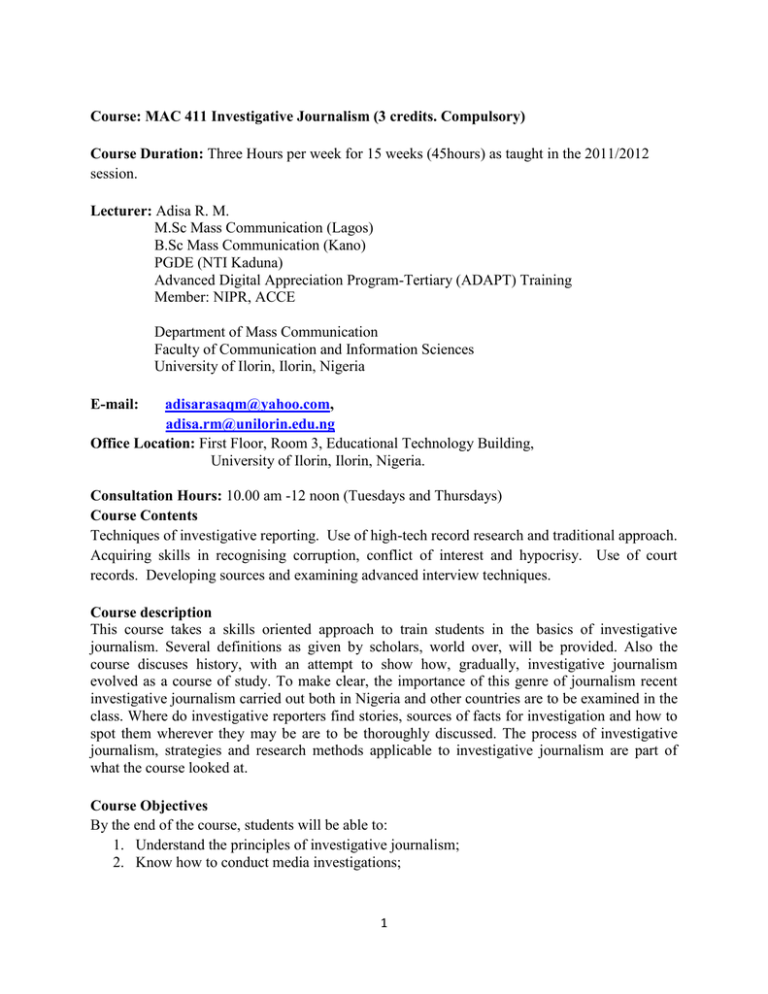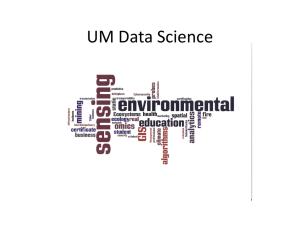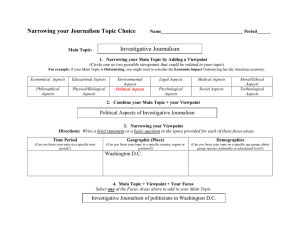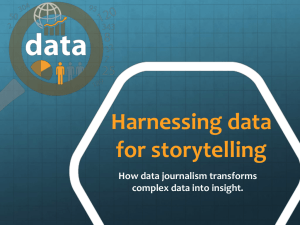Course: MAC 411 Investigative Journalism (3 credits. Compulsory) Course Duration: Lecturer:
advertisement

Course: MAC 411 Investigative Journalism (3 credits. Compulsory) Course Duration: Three Hours per week for 15 weeks (45hours) as taught in the 2011/2012 session. Lecturer: Adisa R. M. M.Sc Mass Communication (Lagos) B.Sc Mass Communication (Kano) PGDE (NTI Kaduna) Advanced Digital Appreciation Program-Tertiary (ADAPT) Training Member: NIPR, ACCE Department of Mass Communication Faculty of Communication and Information Sciences University of Ilorin, Ilorin, Nigeria E-mail: adisarasaqm@yahoo.com, adisa.rm@unilorin.edu.ng Office Location: First Floor, Room 3, Educational Technology Building, University of Ilorin, Ilorin, Nigeria. Consultation Hours: 10.00 am -12 noon (Tuesdays and Thursdays) Course Contents Techniques of investigative reporting. Use of high-tech record research and traditional approach. Acquiring skills in recognising corruption, conflict of interest and hypocrisy. Use of court records. Developing sources and examining advanced interview techniques. Course description This course takes a skills oriented approach to train students in the basics of investigative journalism. Several definitions as given by scholars, world over, will be provided. Also the course discuses history, with an attempt to show how, gradually, investigative journalism evolved as a course of study. To make clear, the importance of this genre of journalism recent investigative journalism carried out both in Nigeria and other countries are to be examined in the class. Where do investigative reporters find stories, sources of facts for investigation and how to spot them wherever they may be are to be thoroughly discussed. The process of investigative journalism, strategies and research methods applicable to investigative journalism are part of what the course looked at. Course Objectives By the end of the course, students will be able to: 1. Understand the principles of investigative journalism; 2. Know how to conduct media investigations; 1 3. Have the skills to use investigative journalism to make worthwhile contribution to society; 4. Know how to present investigative report. Course Requirements Participants in the course are required to: 1. A minimum of 75% attendance qualifies students for writing the end of semester examination in this course; 2. All written assignments and feature stories must be word processed; 3. Deadline must be strictly observed. Late assignments will attract penalties; 4. Each student is expected to have a yahoo e-mail account, join and participate in the course’s online discussion group. Methods of Grading Performance in the course will be graded using the guidelines in the table below. Criterion Percentage Score of Total Marks Test 10 Assignment/Project 15 Participation in online discussion group 5 Final Examination 70 Total 100 Course Delivery Strategies The main method of course delivery is face-to-face lectures, discussions, and small group exercises and fieldwork some of which shall be presented in the class. Lecture Contents Week 1: Overview of Investigative Journalism Objective The main objectives of the week 1 lecture are to distinguish investigative journalism from other kinds of journalism, to give various definitions of investigative journalism, process of investigative journalism, Description First Hour Definitions of investigative journalism Second Hour Overview of other types of reporting such as straight news, feature story, precision journalism, editorial, interpretative journalism. Third Hour Similarities and differences of investigative journalism and others. 2 Study questions 1. What is investigative journalism? 2. How does it differ from other types of journalism practice? 3. What qualities required of investigative reporter? 4. Define precision journalism. 5. What is interpretative journalism? Reading List 1. Burgh4 H. (2005). Investigative Journalism Context and practice. London: Routledge, pp 18-22. ISBN 0-203-37336-7 (Adobe e-Reader Format) 2. Hugo4 de Burgh (2008). Investigative Journalism. (Second Edition). New York: Routledge, pp 10-13. ISBN 0-203-89567-3 Master e-book 3. Waisbord4 S. (2003). watchdog journalism in South America News, Accountability, and Democracy. New York: Columbia university press, pp xv-xix. ISBN 0–231–11975–5 4. Franklin4 B. et al. (2005). Key Concepts in Journalism. London: Sage Publications Ltd, pp 122-123. ISBN 1 7619 4481 8 Week 2: Nature of investigative journalism Objective The main objective of this week is to discuss the environment and characteristics of investigative journalism. Description First Hour Investigative journalism tenets Second Hour Why investigative journalism must be original research Third Hour Examples and analyses from investigative journalism cases. Study questions 1. How important is research to investigation? 2. Give five reasons why investigative journalism must be original research. 3. Cite different cases to explain information someone is trying to hide and potential wrongdoing as characteristics of investigative journalism. 4. List the tenets of investigative journalism. 5. What is potential wrong doing? Reading List 1. Randall 4 D. (2000). Universal Journalist. (Second edition). London: Pluto Press, pp. 99111. ISBN 0-7453-1642-5. 2. Burstiner3 M. Investigative Reporting from Premise to Publication. Available at http://bigstory.hh-pub.com/investigative.php. Accessed 14th Oct., 2009 3 Week 3: Skills of Investigative Journalism Objective The objective of this week lecture is to identify and analyze the traits and skills required of investigative journalism reporters, especially in Nigeria. Description First Hour The will to succeed Awareness of existing laws Good knowledge of sources and their characteristics Second Hour Abundance self confidence Broad general knowledge and interest Computer literacy Third Hour The art of persuasion Flexibility Study Questions 1. Describe the extent of computer literacy required of investigative reporter. 2. List laws applicable to investigative journalism. 3. What characteristics of sources do investigative journalists need to be aware of? 4. What is persuasion? 5. How can an investigative journalist persuade a reluctant source? Reading List 1. Aina4 S. (2004) Intermediate News writing and Reporting. Abeokuta: Julian Publishers, pp192-207. ISBN-978-33146-9-6 2. Hugo4 de Burgh (2008) Investigative Journalism. (Second Edition). New York: Routledge, PP 17-20 ISBN 0-203-89567-3 Master e-book 3. Burstiner3 M. Investigative Reporting from Premise to Publication. Available at http://bigstory.hh-pub.com/investigative.php. Accessed 14th Oct., 2009 Week 4: Investigative Issues/Productive Areas (Class exercise and discussion) Objective This week lecture will focus on issues and events Journalists can investigate. Students will be guided to identify, examine and discuss issues which often lend themselves to investigative reporting such as corruption, abuse of power, government activities, crises etc. First Issues and events Journalists can investigate Second Corruption, abuse of power, government activities, crises 4 Third Hours Exercise/project: Students to discuss the investigative projects/assignments they will pursue during the Harmattan semester. They will also explain to the class why the story should be pursued, and the impact the report would have on the society if published. Study Questions 1. List 20 issues, areas or incidents that are open for investigative reporting in Nigeria. 2. Explain three of the issues. 3. Identify the common issues often investigated by the Nigerian newspapers. Reading List 1. Newspapers/Magazines. 2. Television and radio news. Week 5: Computer Assisted Reporting (CAR) Objective The tools of an investigative reporter have changed considerably. So this week we shall explain each of these tools, and illustrate their uses, introduce the techniques of computer-assisted reporting, provide a sample of useful Internet Web sites for investigative research. Description First Hour Computer, modem and the appropriate software. Quality of Online Information Second Hour The Internet E-mail, World Wide Web Browsers, Search Engines Third Hour People Finders Place Finders Government databases Sites for Journalists Exercise: 1. Start your preliminary research by doing a basic online search of your topic. 2. Find blogs in which people discuss issues events or issues related to your topic. 3. Using a news search engine, try to find news stories related to your topic. 5 Study Questions 1. List relevant software for investigative works. 2. How will you determine quality of online information? 3. Trace the history of internet. 4. Describe how you will use e- mail for investigation. 5. List the relevant sites for investigative journalism. Reading List 1. 1.Burstiner3 M. Investigative Reporting from Premise to Publication. Available at http://bigstory.hh-pub.com/investigative.php. Accessed 14th Oct., 2009 2. Whitaker4 W. R. et al. (2004). Media Writing Print, Broadcast and Public Relations (Second edition). New Jersey: Lawrence Erlbaum Associates, Inc, PP. 66-72. ISBN 08058-4688-3 3. Hall4 J. (2001). Online Journalism a Critical Primer. London: Pluto Press, PP. 41-47 ISBN 0-7453-1193-8 4. Quinn4 S. and Lamble S. (2008). Online Newsgathering Research and Reporting for Journalism. Oxford: Focal Press, pp. 15 25, 29-39. ISBN: 978-0-240-80851-2 Week 6: Process of Investigative journalism Objective This week, students will be able to apply different processes of investigative journalism to the issues that must have been selected for investigation in week 3. To explain the role of research in the writing process, to describe the research process and criteria for effective undercover and independent probe. Description First Hour Research Interview Independent probe Second Hour Participant observation The Internet – the Journalist’s Tool Documentary sources Collaboration with international media organizations Third Hour Undercover/ Basic Bugging Exercise Out of your research, try to come up with the following: a. the government, industry or watchdog organization that regulates or monitors the problem you are investigating b. a list of names and contact information of people to interview 6 c. The initial questions you need to ask these people in the interviews d. The basic information that you will need to understand the answers they give you Study Questions 1. Explain research as a process of investigation in journalism. 2. List the steps in investigative journalism interview. 3. Describe how independent probe is carried out. 4. Discuss participant observation in investigative journalism. 5. Identify international media organizations that support investigative journalism. 6. Discuss the conditions for employing bugging as a means of investigation. 7. Define undercover investigation. Reading List 1. Randall 4 D. (2000) Universal Journalist. (Second edition). London: Pluto Press, pp. 99111. ISBN 0-7453-1642-5 2. Aina4 S. (2004) Intermediate News writing and Reporting. Abeokuta: Julian Publishers, pp. 192-207. ISBN-978-33146-9-6 3. Hugo4 de Burgh (2008) Investigative Journalism. (Second Edition). New York: Routledge, pp. 20 -22 ISBN 0-203-89567-3 Master e-book Weeks 7- 8: Strategies of investigative journalism Objective Investigative reporters employ various strategies and tactics to carry out their investigations, depending on the size of the project and the subject they want to investigate. This week’s lectures shall examine and evaluate these strategies. Description First Hour week 7 Rationale for Investigative assignment Forming of investigation hypothesis Second Hour week 7 Examine initial information on the issue Identification of the relevant sources Third Hour week 7 Getting first information from source Consider the underlying values First Hour week 8 Meeting the alleged offenders Digging for documents 7 Second Hour week 8 Information Analysis Weighing up and comparing evidence Third Hour week 8 Involvement of security agents Legal or ethical implications How the story will be treated and presented in words Study Questions 1. How would you identify People affected by the problem you are investigating? 2. How would you identify the people responsible? 3. Determine the kinds of documents that might be easily available through your local and state governments and at the federal level. 4. How will you examine the initial information about an investigation? 5. What are the underlying values to consider in investigative journalism? 6. Explain the process of digging for documents. 7. How will you Weigh up and compare evidence of investigation? 8. Describe the ethical and legal constraints of investigative journalist. Reading List 1. Aina4 S. (2004). Intermediate News writing and Reporting. Abeokuta: Julian Publishers, pp. 203-205. ISBN-978-33146-9-6 2. Randall4 D. (2000). Universal Journalist. (Second edition). London: Pluto Press, pp. 100111. ISBN 0-7453-1642-5 Week 9: Evaluation of Sources for investigative reporting Objective Given the importance of sources to investigative operation and the tendency for sources to give wrong information we shall this week examine methods for evaluation of sources. Description Three questions to guide evaluation of an interviewee’s information to be answered are; First Hour Was the person an observer of the incident, or did he or she hear about it from someone else? Second Hour Third Hours Is the source a competent observer? Can the source provide precise details that have a ring of truth and seem consistent with the facts? Study questions 1. What is the ideal relationship between investigative reporters and sources? Why 2. What are the characteristics of sources? 3. List and explain different categories of attributions of sources? 8 4. Describe a competent observer. 5. Explain the challenges of source evaluation. Reading List 1. Fedler4 F. et al. (2005). Reporting for the Media, (Eighth Edition). Oxford: Oxford University Press, pp. 135-136 ISBN 0-19-516999-9. 2. Whitaker4 W. R. et al. (2004) Media Writing Print, Broadcast and Public Relations (Second edition). New Jersey: Lawrence Erlbaum Associates, Inc, pp. 62-65. ISBN 08058-4688-3. 3. Burstiner M. Investigative Reporting from Premise to Publication. Available at http://bigstory.hh-pub.com/investigative.php.3 Accessed 14th Oct., 2009 Week 10: Sourcing the Story Objective This week some of the ways in which investigative interview differs from news interview are explained. Also the strategies that can be adopted to elicit relevant information and facts are discussed. Description First Hour Interview Tip-offs and contacts The research needed before an interview Second Hour The basic questions that serve as guide to interviewer Why interviewing? Whom to interview? Third Hour When to interview? Where to conduct the interview? What questions to ask? How to conduct the interview? Exercise Students will pair off and interview each other, following the interviewing skill guidelines Study questions: 1. How important are tip-offs to investigative journalism? 2. What are the initial steps to take before commencing on interview? 3. List key segments in interview process. 4. What is the relevance of place of the interview? 5. Describe how interview is conducted. 9 Reading List 1. Fedler4 F. et al. (2005) Reporting for the Media, (Eighth Edition). Oxford: Oxford University Press, pp 269-277. ISBN 0-19-516999-9 2. Burstiner M. Investigative Reporting from Premise to Publication. Available at http://bigstory.hh-pub.com/investigative.php3. Accessed 14th Oct., 2009 Week 11: Hindrances to Investigative Journalism Objective The objectives of this week are to identify and explain the problems confronting journalists in the course of carrying out investigative work in Nigeria and developed countries. Description First Hour Legal restriction Ownership influence Second Hour High level of financial commitment Risk involve Third Hour Poor data storage Poor staffing Study Questions: 1. How do the problems- hindrances affect investigative journalism in Nigeria? 2. List 10 journalists that have suffered any form of hindrances in Nigeria. 3. Discuss the legal restriction of investigative journalism. 4. Describe media ownership structure in Nigeria. 5. State the risk involved in investigative journalism. Reading List 1. Aina4 S. (2004). Intermediate News writing and Reporting. Abeokuta: Julian Publishers, pp206-207. ISBN-978-33146-9-6 2. Forbes D. (2005). A Watchdog’s Guide to Investigative Reporting. Johannesburg: Konrad Adenauer. Pp. 47- 53. ISBN: 09584936-6-9. Week 12: Legal Concerns in Investigative Journalism Objective Given the sensitivity of investigative journalism, the legal limitations and responsibilities of journalists carrying out investigative work are explained to students. 10 Description First Hour Defamation How can defamation be established against investigative reporters? Defenses available for investigative reporters? Second and Third Hours Privacy: Types of privacy Limitations to pretrial and trial coverage Right of access to the source of information Freedom of information law Study Questions: 1. Define defamation. 2. For an investigative journalist accused of committing libel, what are the defenses available for him? 3. List types of privacy journalist must not violate 4. How does the court affect investigative journalism practice? 5. Describe pretrial and trial coverage. Reading List: 1. Fedler4 F. et al. (2005). Reporting for the Media, (Eighth Edition). Oxford: Oxford University Press, pp. 561- 588. ISBN 0-19-516999-9. 2. Issa4 A. O. and Adisa R. M. (2009). Essentials of Technical Paper Writing. Offa: AhlanWasahlan Print, pp. 74-88. ISBN 978-34656-8-1. Week 13: Cases Objective This week, students will be acquainted with the knowledge of the various investigative reporting that had been done in history. Description First Hour Watergate (One of the best known case of investigative journalism) Ten days in a madhouse (undercover that exposed asylum’s condition) Second Hour Ten days in a madhouse (undercover that exposed asylum’s condition) 11 Third Hours Eight weeks in the Buckingham palace (undercover) Salisu Buhari Certificate saga (The News Magazine, Nigeria) Evans Enwerem Certificate forgery (The Tell Magazine) etc. Study Questions 1. List at least five successful investigative reporting in Nigeria. 2. Relate Watergate and Salisugate to current trend in investigative journalism. 3. Trace the history of Watergate story. 4. Describe Salisu Buhari certificate saga in Nigeria. 5. Identify and explain the methods used in exposing Salisu Buhari. Reading List 1. Aina4 S. (2004). Intermediate News writing and Reporting. Abeokuta: Julian Publishers, pp. 194-200. ISBN-978-33146-9-6. 2. Hugo4 de Burgh (2008). Investigative Journalism. (Second Edition). New York: Routledge, pp. 191-289 ISBN 0-203-89567-3 Master e-book Week 14: Putting the Story Together. Writing Objective The objectives of this week are to explain the mechanism of news story writing, to create a cohesive story or set of stories that are complete, clear, convincing and compelling, an investigative story that will lay out a problem so convincingly. Description First Hour The lead writing styles Writing leads Second Hour Basic investigative news story materials Using quotations Identification Third Hour Attribution Background/Tie back Story unity Study Questions: Look at the writing structure in other reporters’ stories. Write the first and second drafts of your story by following these guides: 1. Identify the central characters. 2. Identify the problem. 3. Explain how the problem works. 12 4. Explain why the problem occurs. 5. Show how we got to this point. 6. Point out possible solutions. Reading List 1. Fedler4 F. et al. (2005). Reporting for the Media, (Eighth Edition). Oxford: Oxford University Press, pp 59-72 ISBN 0-19-516999-9 2. Whitaker4 W. R. et al. (2004). Media Writing Print, Broadcast and Public Relations (Second edition). New Jersey: Lawrence Erlbaum Associates, Inc, pp. 135-140 ISBN 08058-4688-3. Week 15: Revision Objective This week which is the last week of lecture in the semester, students will have the opportunity of seeking for clarifications on any difficult area. Also, they will be expected to submit the investigative project/ assignment given in week 4. Revision Questions: 1. What is investigative journalism? 2. Give five reasons why investigative journalism must be original research. 3. Cite different cases to explain information someone is trying to hide and potential wrongdoing as characteristics of investigative journalism. 4. What characteristics of sources do investigative journalists need to be aware of? 5. List 20 issues, areas or incidents that are open for investigative reporting in Nigeria. 6. Describe how you will use e- mail for investigation. 7. List the relevant sites for investigative journalism. 8. Explain research as a process of investigation in journalism. 9. List the steps in investigative journalism interview. 10. Describe how independent probe is carried out. 11. Discuss participant observation in investigative journalism. 12. List and explain different categories of attributions of sources? Reading List 1. Aina4 S. (2004) Intermediate News writing and Reporting. Abeokuta: Julian Publishers, ISBN-978-33146-9-6. 2. Fedler4 F. et al. (2005) Reporting for the Media, (Eighth Edition). Oxford: Oxford University Press, ISBN 0-19-516999-9. 3. Hall4 J. (2001) Online Journalism a Critical Primer. London: Pluto Press. ISBN 0-74531193-8. 4. Hugo4 de Burgh (2008) Investigative Journalism. (Second Edition). New York: Routledge. ISBN 0-203-89567-3 Master e-book 5. Issa4 A. O. and Adisa R. M. (2009) Essentials of Technical Paper Writing. Offa: AhlanWasahlan Print. ISBN 978-34656-8-1. 13 6. Quinn4 S. and Lamble S. (2008) Online Newsgathering Research and Reporting for Journalism. Oxford: Focal Press. ISBN: 978-0-240-80851-2. 7. Randall4 D. (2000) Universal Journalist. (Second edition). London: Pluto Press. ISBN 07453-1642-5. 8. Waisbord4 S. (2003) watchdog journalism in South America News, Accountability, and Democracy. New York: Columbia university press. ISBN 0–231–11975–5. 9. Whitaker4 W. R. et al. (2004) Media Writing Print, Broadcast and Public Relations (Second edition). New Jersey: Lawrence Erlbaum Associates, Inc. ISBN 0-8058-46889. Burstiner M. Investigative Reporting from Premise to Publication. Available at http://bigstory.hh-pub.com/investigative.php3. Accessed 14th Oct., 2009. Key 1- Available in the University Library 2- Available in local bookshops 3- Available on the Web. 4- Personal collection 5- Departmental libraries 14



